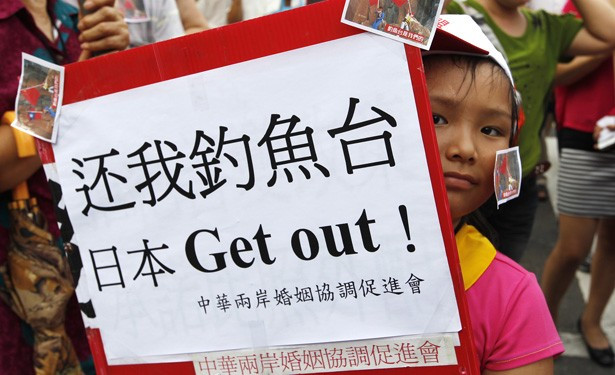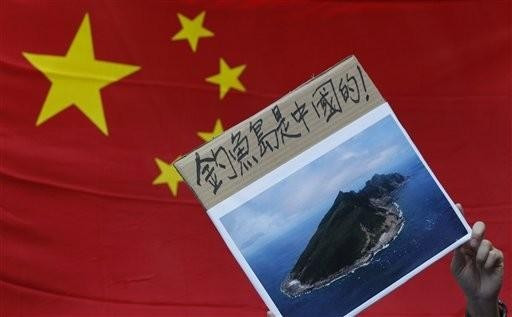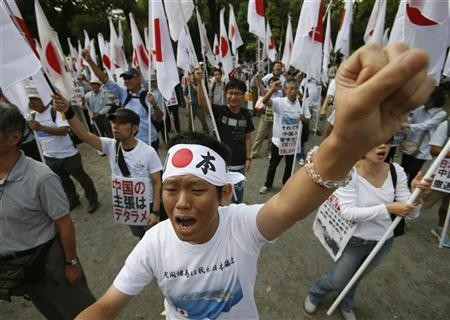China's New Leaders: Where Next for Sino-Japanese Relations in Diaoyu/Senkaku Islands Dispute?
As the 18th Party Congress prepares to anoint a new leadership, China expert Jonathan Fenby warns of the potential of nationalism undermining economic progress for the new superpower.

Deng Xiaoping, the patriarch who set China on the path of market-led economic growth, believed that his country should adopt a low profile in international affairs so as not to antagonise foreign nations that provided markets for its exports and companies that would bring their technology and expertise to help the People's Republic to develop.
That policy no longer applies.
Though Beijing still insists that its rise will be peaceful, China is playing a tougher game with foreign firms that operate on the mainland and has become much more assertive about what it sees as its rights in its relations with other Asian states. This started with rows with southern neighbours over fishing grounds and subsea energy reserves but is broadening into a serious confrontation with the other major East Asian power, Japan, leading to negative effects for business in both countries.
The two countries have a long history of hostility.
Japan first invaded China in 1894-5 and carried out a ruthless campaign of occupation between 1931 and 1945 which led to the deaths of many millions of Chinese and widespread devastation. Incidents such as the Rape of Nanjing was said to have been responsible for 300,000 deaths. Beijing insists that the Japanese have never really apologised and are outraged when leading figures pay homage at a Tokyo shrine where war criminals are buried.
Since the 1990s, anti-Japanese feeling has erupted on the mainland at regular intervals, sometimes encouraged by the authorities as an outlet for Chinese nationalism.
The two nations have been at odds for the past two years over fishing rights off Japan's coast as Chinese trawlers have clashed with Japanese coastguard vessels. But the touchy relations between Tokyo and Beijing have now escalated because of the ratcheting up of their rival claims to a rocky group of small, uninhabited islands known by the Japanese as the Senkaku and by the Chinese as the Diaoyu. Situated amid rich fishing grounds, the islands may sit on top of valuable mineral reserves.

This long-running dispute became a flashpoint this autumn when the governor of Tokyo, Shintaro Ishihara, who holds strong anti-Chinese views, proposed to buy the islands from their private owner. The Japanese government stepped in to take them over in September. This provoked anger from Beijing and moved the confrontation to a higher level involving national sovereignty from which it is difficult for either administration to back down. After a long history of not standing up to China, Japan has been unusually firm while China has pressed its claims. Recently, China said that four of its maritime surveillance ships sailing off the islands had expelled Japanese vessels that were there "illegally".
Beijing also expressed its displeasure by refusing to send its Central Bank governor to the IMF meeting in Tokyo while the Japanese and Chinese prime ministers have decided not to hold talks at a summit of Asian and European leaders.
The domestic political context makes accommodation difficult.
The People's Republic is about to go through its major leadership transition and the incoming group of Communist Party and government chieftains cannot be seen to be less than patriotic as Chinese stage anti-Japanese demonstrations and boycott Japanese products. Meanwhile the uncertain political situation in Japan and the weakness of Prime Minister Yoshihiko Noda has boosted nationalist rhetoric . The Tokyo governor is forming a political party which will take a strident line.
The United States has become the third player, but in an awkward role.
It wants to maintain working relations with China but has a bilateral security treaty with Japan. In the run-up to the presidential elections, President Obama, who has committed his administration to developing what he calls the "Pacific pivot", cannot be seen not to support the main US ally in Asia. A group of former senior American officials who visited Beijing recently told the Chinese that the security treaty covers the islands. Richard Armitage, former deputy secretary of state, who was in the delegation, said the US would come to Japan's aid if China attacked.

Anti-Chinese sentiment in Japan is probably stronger than it has been since the Second World War.
But it is in the People's Republic that the business effect has been most felt. China is a key manufacturing and assembly base for many Japanese companies and some are reporting that their Chinese joint venture partners, suppliers and workers have become more hostile in recent weeks. Sales of Japanese cars have slumped as have purchases of Japanese food products. This hits Japan's companies in the first instance but if it leads them to reduce their involvement with China, it too will suffer, from withdrawal of investment and technology and a loss of jobs.
The islands are not the only cause of conflict.
China is involved in disputes over maritime rights with nations in southeast Asia where it claims sovereignty over the whole of the South China Sea, an assertion rejected by other regional states notably Vietnam and the Philippines. Vietnamese government officials said that there was no end in sight to the maritime dispute with China involving an area potentially rich in oil and gas.
Despite the hard line being taken on all sides and the gung-ho political context, these confrontations look at this stage unlikely to lead to outright fighting. But the way in which sovereignty issues have become dominant is still dangerous. China and Japan plan to form a free trade zone, with South Korea also included, that would mark the next stage in the emergence of east Asia as the economic counterweight to the West. It would be counter-productive to their longer-term interests if disputes over the tiny islands set them off on a course of sharpened confrontation.
But once China's leadership transition is completed and Japan gets a stronger government, the politicians on both sides will have to apply themselves to putting on the brakes if nationalism is not to undermine economic progress.
Jonathan Fenby has just published a wide-ranging account of contemporary China entitled Tiger Head, Snake Tails; China Today. He is China director of the emerging markets research service, Trusted Sources, and blogs On China
© Copyright IBTimes 2025. All rights reserved.





















